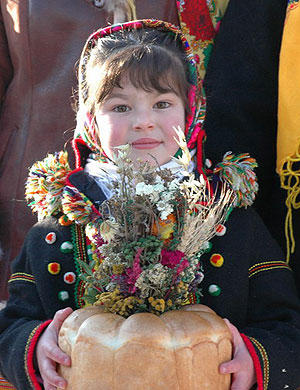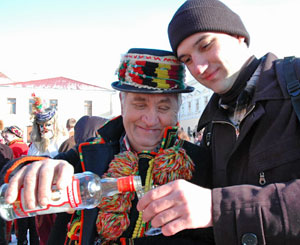- About Ukraine
- Hutsuliya
- Rest and Tourism
- Photograph Album
- Library
- Hutsul Legends
- Hutsul Customs and Traditions
- The Carpathian Pastoral
- Hutsul’s Hospitality and Politeness
- Hutsul Wedding
- The Wedding Day In Kosiv
- Hutsul Holidays and Traditions
- Hutsul Folk Art
- Feed
- Store
Ukrainian scientists and journalists from time to time address Hutsul’s folk art, customs and ceremonies but seldom speak about Hutsul’s hospitality and politeness. Instead, foreign visitors notice these as the main characteristics of Hutsuls. Polish ethnographers and poets Oscar Colbert and Stanislav Vintsenz, and French journalist Tomas Huask paid attention to the politeness of Hutsuls. Really, everyone who visited Hutsulshchyna was received respectfully and politely.
On a first time visit, travelers were treated to banush, bryndza, and milk and were charmed with Hutsul’s music, songs and dances. In Hutsulshchyna children addressed parents respectfully with a formal “You”. They respect not only each person but also each plant and each animal. Politeness is highly appraised among people who have lived in the mountains or forests for such long periods of time.
Hutsul’s politeness is shown best in carols, wedding wishes, and even in prayer. On the New Year they wish the happiest year for kids with jingle-bells and everyone telling each other “Be of good cheer”.

Christmas is a pleasant day when Hutsuls invite poor and lonely people. It is a good sign for all the family. After a prayer on the Holy Evening, the master takes, in both hands, a large pot of wheat grouts with raisings, poppy seed, and honey, and the mistress takes a tallow candle. The master stops in the middle of the entrance-hall and says: “Preholy the Sun and the sweet Moon, bright stars, abundant rains come to us for the Holy Supper to eat wheat grouts with raisings, poppy seed, and honey!”
Then, for the second time, “All our heads — Lada, come with us to have Holy Supper”.
In Hutsulshchyna respectfulness to each individual begins at birth. Neighbors and relatives greeted a woman in childbirth. Later, the Godfathers, Godmothers and the pastor, do the same — wishing the best of luck for mother and child. Mother, herself, greets her little one daily and at every hour with lullabies wonders pearls, wishing her new child, from the bottom of her heart, to always be happy and good-looking.
In Kosmach, a midwife, when the child was born, had to tell her: “And now grow, without illness, without sorrow, and without poverty”. This wish was addressed to the girl; suitable language for a wish for a boy is different. Above all such wishes will be an address to the fellow whom hutsuls will tell off to the forces.
In Putyla, in Bukovyna they say: “Pavlyku, be in luck on green springs, good people, ardent love! Let the melody of triple music always call you back to your father’s house, to the well of your mother’s love! Let the bullets go around you, let the soldiers love you”.
Hutsuls seek to tell everyone, as many as possible, more frank, fine and kind words.

People who arrive to Hutsulshchyna pay attention to the politeness of the mountaineers, because in every Hutsul’s village they politely greet all whom they meet on their way; whether familiar or unknown traveler.
Here is another custom. When coming into a house they must say, good morning, good afternoon, or good evening. Then the master or the mistress will ask them to sit down. “Thank you, let all your sits be good”, is the answer to the master after his invitation. In these wishes there is poetry and heartness. In this wishes there is the history of a region, the history of Hutsulshchyna, and the history of Ukraine. In those wishes there is the history of our people.

